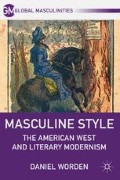Abstract
Masculinity is not a thing but a history. Actions, bodies, styles, texts, images, publics, and politics compose this history. One does not “possess” masculinity, in the sense of having a penis, a gun, or a rugged leather jacket. Instead, one acts masculine, and this acting involves negotiation of a complex set of signs. The often-voiced commands to walk, talk, act, and take it “like a man” make clear that masculinity does not reside in a male body but instead in a series of performative gestures and public presentations. Being “like a man” has little to do with possession and everything to do with performance.1
Access this chapter
Tax calculation will be finalised at checkout
Purchases are for personal use only
Preview
Unable to display preview. Download preview PDF.
Notes
Judith Butler, Bodies that Matter: On the Discursive Limits of “Sex” (New York: Routledge, 1993), 1–55.
Frederick Jackson Turner “The Significance of the Frontier in American History” Does the Frontier Make America Exceptional?, ed. Richard Etulain (Boston: Bedford, 1999), 18–43.
Constance Penley and Sharon Willis, “Introduction,” Male Trouble, ed. Constance Penley and Sharon Willis (Minneapolis: U of Minnesota P, 1993), xviii.
Gail Bederman, Manliness and Civilization: A Cultural History of Gender and Race in the United States, 1880–1917 (Chicago: U of Chicago P, 1995), 42.
Amy S. Greenberg, Manifest Manhood and the Antebellum American Empire (Cambridge: Cambridge UP, 2005).
Mary Chapman and Glenn Hendler, eds., Sentimental Men: Masculinity and the Politics of Affect in American Culture (Berkeley: U of California P, 1999).
Judith Halberstam, Female Masculinity (Durham: Duke UP, 1998), 2.
Jean Bobby Noble, Masculinities Without Men?: Female Masculinity in Twentieth-Century Fictions (Vancouver: U of British Columbia P, 2004).
Wendy Brown, States of Injury: Power and Freedom in Late Modernity (Princeton: Princeton UP, 1995), 167.
Fredric Jameson, The Political Unconscious: Narrative as Socially Symbolic Act (Ithaca: Cornell UP, 1981), 102.
Rita Felski, The Gender of Modernity (Cambridge: Harvard UP, 1995), 114.
Aaron Jaffe, Modernism and the Culture of Celebrity (New York: Cambridge UP, 2005).
Michael North, Reading 1922: A Return to the Scene of the Modern (New York: Oxford UP, 1999), 11.
Raymond Williams, “When Was Modernism?,” The Politics of Modernism: Against the New Conformists, ed. Tony Pinkney (New York: Verso, 2007), 35.
E. E. Cummings, “Buffalo Bill’s,” 100 Selected Poems (New York: Grove P, 1994), 7.
Peter Bürger, Theory of the Avant-Garde, (Minneapolis: U of Minnesota P, 1984).
Joy S. Kasson, Buffalo Bills Wild West: Celebrity, Memory, and Popular History (New York: Hill & Wang, 2000).
Michael S. Kimmel, Manhood in America (New York: Free P, 1996).
T. S. Eliot, The Waste Land, 1922, Selected Poems (New York: Harcourt, 1964).
Donald J. Childs, “Stetson in The Waste Land,” Essays in Criticism 38.2 (April 1988): 131–48.
Lee Edelman, No Future: Queer Theory and the Death Drive (Durham: Duke UP, 2004).
F. Scott Fitzgerald, The Great Gatsby (New York: Collier, 1992), 184.
Michael T. Gilmore, Surface and Depth: The Quest for Legibility in American Culture (New York: Oxford UP, 2003), 139.
William Faulkner, Light in August (New York: Vintage, 1990), 111–12.
David M. Earle, Re-Covering Modernism: Pulps, Paperbacks, and the Prejudice of Form (Burlington: Ashgate, 2009).
Bill Brown, A Sense of Things: The Object Matter of American Literature (Chicago: U of Chicago P, 2003), 3.
Willa Cather, “The Novel Démeublé,” Willa Cather: Stories, Poems, and Other Writings, ed. Sharon O’Brien (New York: Library of America, 1992), 834.
Copyright information
© 2011 Daniel Worden
About this chapter
Cite this chapter
Worden, D. (2011). Introduction. In: Masculine Style. Global Masculinities. Palgrave Macmillan, New York. https://doi.org/10.1057/9780230337992_1
Download citation
DOI: https://doi.org/10.1057/9780230337992_1
Publisher Name: Palgrave Macmillan, New York
Print ISBN: 978-1-349-29852-5
Online ISBN: 978-0-230-33799-2
eBook Packages: Palgrave Literature CollectionLiterature, Cultural and Media Studies (R0)

